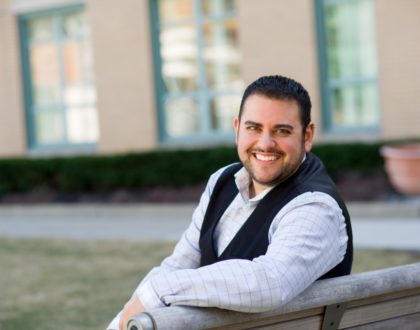Leadership in Focus: Robbie Samuels

Robbie Samuels, LeadBoston Class of 2015 and recently named LeadBoston Alumni Engagement Chair, has deep expertise in socially responsible leadership – and he’s eager to share it! Since moving to Boston in 2002, Robbie has immersed himself professionally and personally in social justice work and leadership. In addition to his ten year tenure in development at GLBTQ Legal Advocates & Defenders (GLAD), he founded Socializing for Justice (SoJust), a nearly 3,000 member grassroots cross-cultural, cross-issue progressive community and network in Boston. In 2015, as a full time speaker and consultant, Robbie completed the LeadBoston program and has continued as an active alumnus, organizing consistent meetups and events for the LeadBoston Alumni Network.
Robbie recently shared with us his experiences and wisdom on being a socially responsible leader in Boston. Here are the highlights:
1. Leadership is seeing the big picture and breaking out of our silos.
The breadth of social justice work is daunting and complex. It makes sense that people focus on issue areas in order to be more effective in creating social change. While there are many benefits to sticking to what we know, Robbie stresses the importance for leaders to bridge sectors and ideologies in order to understand social change as a collective and collaborative process.
“I recognized myself as a multi-issue, multi-identity person but I had a hard time finding places where I could bring all of me into a conversation”
Robbie describes searching for this type of community during his early years in Boston: “I recognized myself as a multi-issue, multi-identity person but I had a hard time finding places where I could bring all of me into a conversation and not feel like ‘today we’re only allowed to talk about race, today we’re only talking about feminism, today we’re only talking about LGBT’ and we can’t bring these other things in. I wanted to find my people and I didn’t mean a demographic, I meant an ideology around or belief in issues being held in a certain way together.”
Cross-sector collaboration is a key component of the LeadBoston program and arguably, the most impactful for leaders like Robbie, who get outside the silos they are already in and tap into new networks. For his LeadBoston leadership commitment, Robbie launched the weekly podcast, On the Schmooze, to highlight professionals from different fields, many from the LeadBoston Alumni Network, and their experiences with leadership and networking. Robbie is always tapping into the Alumni Network for future guests and hopes to continue to nurture diverse connections in his new role as Alumni Engagement Chair.
2. Leadership is relational.
Leadership often begins with networking or as Robbie describes, “A relational networking, it’s not tit for tat, it’s offering before asking, and it’s putting value in a room before you try to extract something.” Boston has a robust networking community, ranging from professional meetup groups and after work events to member-driven communities like SoJust and LeadBoston. Robbie has invested in these communities as a person who leads by bringing people together. During his LeadBoston program year, Robbie and other classmates decided that seeing each other once a month for a day (including the 5:05 informal happy hour) was not enough and proposed optional lunches throughout the rest of the program year. The lunch socials continued after graduation and are now open to all LeadBoston alumni.
Robbie would like alumni to know that “The welcome mat is clearly out there. Even if it’s been a decade I would be so thrilled to have you come in. Often what we do is take a minute to talk about what was your big takeaway from your year and that in itself has been a great opening question whenever I’ve met an alum. It’s been wonderful to see even a decade later what sticks with people…LeadBoston is an intense thing to go through and you want to keep in touch with people who have had that shared experience because you want to keep learning, growing and pushing yourself and being part of interesting conversations.” The power and value of these networking spaces is when individuals go beyond superficial or self-motivated interactions to build relationships with others and see the long term investment in getting to know someone.
3. Leadership is bringing people together to achieve change.
While each individual has the ability to impart change, it is through collaboration that greater results can be achieved. Recognizing that we are living in a divisive political climate, Robbie sees great potential in the collective power of the leaders he’s come to know. “I’ve seen many [alumni] working very collaboratively across issues, making a real effort to see how they have a shared concern…it’s wonderful and the alumni that went through [LeadBoston] now have an opportunity to apply what they learned and the experience they had through LeadBoston to the current situation.” Being able to apply newfound knowledge to real-time issues is the underlying mission of LeadBoston, and with leaders who can come together through shared values and commitments, Boston is better positioned to be stronger and more united.
LeadBoston alumni are invited to sign up to receive invitations to Robbie’s LeadBoston Alumni Socials. The next social will be lunch at P.F. Chang’s on Wednesday, May 10.
(Photo credit: Maureen Cotton Photography)
